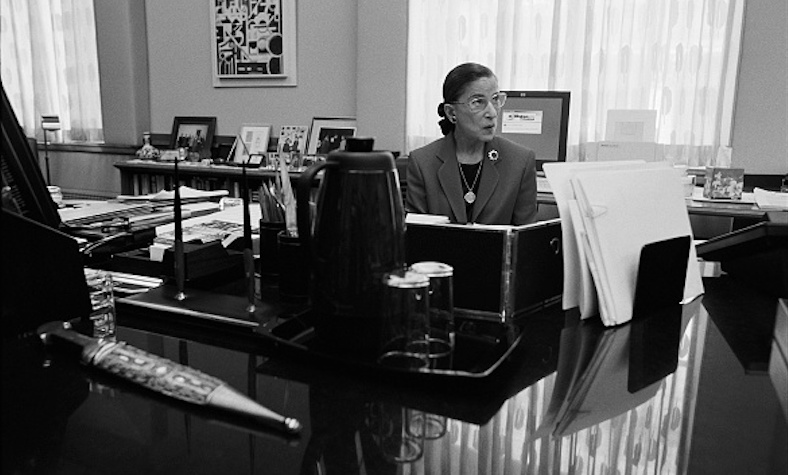
Through her opinions, Justice Ruth Bader Ginsburg sought to instill equality and justice in the law.
The legal profession, the United States, and the world has lost a hero with the passing of Justice Ruth Bader Ginsburg. Known for her leadership in championing gender equality, her passionate dissents, and her steadfast commitment to the principle of equality before the law, Justice Ginsburg profoundly influenced and shaped U.S. constitutional law. Her judicial opinions revealed her unending fight for justice and illuminated her faith in what the United States could be for every person. She inspired generations of young law students with her eloquent prose, sharp analytic reasoning, and continued awareness of how laws impact the most vulnerable among us. In her own life, Justice Ginsburg succeeded in breaking through many barriers to equality—and she dedicated her career as a lawyer, judge, and Justice to breaking down barriers for others. We join with the rest of the United States in mourning the loss of Justice Ginsburg. To honor her memory, The Regulatory Review presents quotations from some of her most significant opinions.
When a State severely limits access to safe and legal procedures, women in desperate circumstances may resort to unlicensed rogue practitioners, faute de mieux, at great risk to their health and safety. So long as this Court adheres to Roe v. Wade, and Planned Parenthood v. Casey, targeted regulation of abortion providers laws like H. B. 2 that “do little or nothing for health, but rather strew impediments to abortion,” cannot survive judicial inspection.
– Concurring in Whole Woman’s Health v. Hellerstedt (2016)
A would-be polluter may or may not be dissuaded by the existence of a remedy on the books, but a defendant once hit in its pocketbook will surely think twice before polluting again.
– Writing for the Court in Friends of the Earth v. Laidlaw Environmental Services (1999)
As I see it, in relatively recent years, the Court’s Arbitration Act decisions have taken many wrong turns. Yet, even accepting the Court’s decisions as they are, nothing compels the destructive result the Court reaches today … Even assuming that the Federal Arbitration Act (FAA) and the National Labor Relations Act (NLRA) were inharmonious, the NLRA should control. Enacted later in time, the NLRA should qualify as “an implied repeal” of the FAA, to the extent of any genuine conflict. Moreover, the NLRA should prevail as the more pinpointed, subject-matter specific legislation, given that it speaks directly to group action by employees to improve the terms and conditions of their employment … The inevitable result of today’s decision will be the underenforcement of federal and state statutes designed to advance the well-being of vulnerable workers.
– Dissenting in Epic Systems Corp. v. Lewis (2017)
Institutional placement of persons who can handle and benefit from community settings perpetuates unwarranted assumptions that persons so isolated are incapable or unworthy of participating in community life. … Confinement in an institution severely diminishes the everyday life activities of individuals, including family relations, social contacts, work options, economic independence, educational advancement, and cultural enrichment.
– Writing for the Court in Olmstead v. L.C. (1999)
Congress never intended to immunize forever discriminatory pay differentials unchallenged within 180 days of their adoption. … This is not the first time the Court has ordered a cramped interpretation of Title VII, incompatible with the statute’s broad remedial purpose. Once again, the ball is in Congress’s court. As in 1991, the Legislature may act to correct this Court’s parsimonious reading of Title VII.
– Dissenting in Ledbetter v. Goodyear Tire and Rubber Co. (2007)
It is on behalf of … women that the United States has instituted this suit, and it is for them that a remedy must be crafted, a remedy that will end their exclusion from a state-supplied educational opportunity for which they are fit, a decree that will “bar like discrimination in the future.” … Women seeking and fit for a VMI-quality education cannot be offered anything less. … A prime part of the history of our Constitution … is the story of the extension of constitutional rights and protections to people once ignored or excluded. VMI’s story continued as our comprehension of “We the People” expanded.
– Writing for the Court in United States v. Virginia (1996)
Volumes of evidence supported Congress’s determination that the prospect of retrogression was real. Throwing out preclearance when it has worked and is continuing to work to stop discriminatory changes is like throwing away your umbrella in a rainstorm because you are not getting wet.
– Dissenting in Shelby County v. Holder (2013)
States, of course, may regulate within the domain Congress assigned to them even when their laws incidentally affect areas within the Federal Energy Regulatory Commission’s domain. But states may not seek to achieve ends, however legitimate, through regulatory means that intrude on FERC’s authority over interstate wholesale rates, as Maryland has done here.
– Writing for the Court in Hughes v. Talen Energy Marketing (2016)
Would the exemption the Court holds Religious Freedom Restoration Act (RFRA) demands for employers with religiously grounded objections to the use of certain contraceptives extend to employers with religiously grounded objections to blood transfusions (Jehovah’s Witnesses); antidepressants (Scientologists); medications derived from pigs, including anesthesia, intravenous fluids, and pills coated with gelatin (certain Muslims, Jews, and Hindus); and vaccinations (Christian Scientists, among others)? … There is an overriding interest, I believe, in keeping the courts “out of the business of evaluating the relative merits of differing religious claims,” or the sincerity with which an asserted religious belief is held. Indeed, approving some religious claims while deeming others unworthy of accommodation could be “perceived as favoring one religion over another,” the very “risk the Establishment Clause was designed to preclude.” The Court, I fear, has ventured into a minefield by its immoderate reading of RFRA.
– Dissenting in Burwell v. Hobby Lobby (2014)
It is well documented that conscious and unconscious race bias, even rank discrimination based on race, remain alive in our land, impeding realization of our highest values and ideals. … From today’s vantage point, one may hope, but not firmly forecast, that over the next generation’s span, progress toward nondiscrimination and genuinely equal opportunity will make it safe to sunset affirmative action.
– Concurring in Grutter v. Bollinger (2003)



